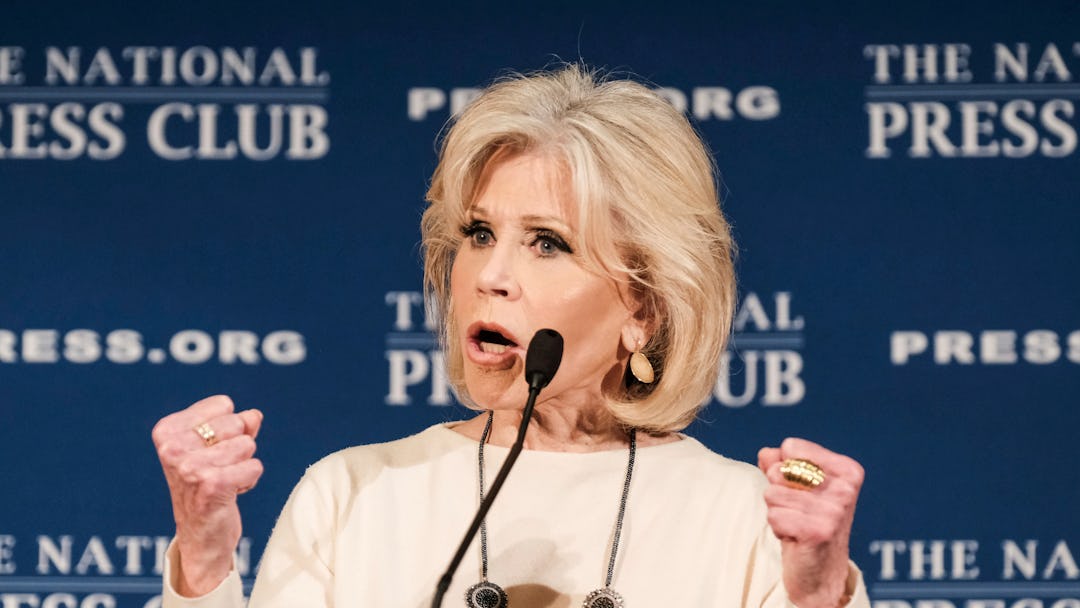Jane Fonda, the woman so invincible neither Monster-in-Law nor The Newsroom could take her down, has a long history of activism. She famously protested the Vietnam War in the early 1970s; in later years, she co-founded the Women’s Media Center with Gloria Steinem and Robin Morgan. So it’s not exactly a surprise that Fonda recently spoke at a conference dedicated to fostering dialogue on gender justice, though said conference focused on the half of the gender binary that isn’t typically implicated in conversations about equality.
The International Conference on Masculinities, organized by Stony Brook University’s Center for the Study of Men and Masculinities, went down at New York’s Roosevelt Hotel over the weekend, and speakers ran the full feminist gamut, from legendary second-wavers like Steinem to corporate posterwoman Sheryl Sandberg to CSMM director and noted academic Michael Kimmel. (“International Conference on Masculinities” may raise some red flags given that the similarly named “International Conference on Men’s Issues” last year was actually a terrifying MRA-fest, but Kimmel is about as far away from Paul Elam as one can get.)
On Saturday, Fonda spoke in conversation with Feministing’s Chloe Angyal on teenage masculinity — because Jane Fonda counts “author of advice book Being a Teen” among her many side hustles, along with “workout tape star” and “instant classer-upper of awards-show joints.” As reported by The Cut, Fonda went straight for the truth bombs, telling her audience, “Masculinity, as it’s defined now, is toxic.”
This isn’t exactly new for Fonda, who just last week compared the patriarchy to a “wounded beast, thrashing about, flailing its tail with the barbs on it.” And it’s important to note that her comments aren’t entirely on point, like this bizarre endorsement of nice-guyism:
Fonda said that many young women today fall into these limits about perceived masculinity by rejecting nicer guys. As a panel leader Chloe Angyal acknowledged, Jane Fonda is addressing the “friend zone” phenomena. “What always touches me so much is that in my meetings with young boys,” said Fonda, “are the boys that say, I know how to treat girls, I treat them with respect, I’m a feminist boy, but she’s my best friend. She won’t be my girlfriend. The girls want to be girlfriends to players, who don’t always treat them well.”
But even though Fonda doesn’t seem to recognize this attitude as a form of male entitlement that’s evidenced both through lighthearted mockery (like eternally relevant Tumblr Nice Guys of OK Cupid and its still-live spinoffs) and in more serious instances like Elliot Rodger’s disturbing manifesto, the rest of her comments thoroughly analyze patriarchy’s effects on men’s, and women’s, psyches:
“…there’s the problem: this deep sense that you have to cut your thoughts from your emotions. That that is the sign of intelligence and maturity,” she said, “but in fact this split is a sign of trauma.” “The wound is patriarchy,” Fonda said. “It has caused men to bifurcate and it has robbed them of humanity. And the going wisdom is that that’s just the way men are. Boys will be boys, and that’s how men are, and it’s women who are mature and emotional.”
Fonda thus joined the ranks of celebrities like Terry Crews and Emma Watson in directly engaging men in conversations on gender. Crews, for his part, wrote an entire book about (and titled) Manhood and has publicly decried what he calls the “Man Code”; Watson, of course, is the spokeswoman for the somewhat divisive #HeforShe campaign, which, in her words, “is about men coming to support women for femininity and for feminine qualities, because they are currently valued less by our society.” (In the same, very recent Q&A, Watson mentioned gender nonconforming folks and even dropped the I-word: intersectionality. Ten points for Gryffindor.)
In a way, this particular form of celebrity activism is a welcome antidote to the now-tiresome focus on famous women who are, or aren’t, willing to explicitly identify as feminists. The question now ranks below only “How do you balance kids with a career?” — or, if there are no kids, why that’s the case — on the list of interview queries that would be valid (and not sexist) if they weren’t exclusively directed towards women.
Masculinity, on the other hand, doesn’t get nearly as much attention, and neither does men’s role in perpetrating or simply being affected by the forces that keep women underpaid and underrepresented. When Fonda, Crews, and Watson explicitly call on men to look inward and direct their energies outward when it comes to gender equality, they’re helping to rectify an unstated assumption that’s handicapped the past few years’ increasing public dialogue on feminism. And they’re doing so in a way that clarifies that there isn’t just a place for men in said dialogue — but that leaving them out, and letting the culture of masculinity go unquestioned, is actively harmful.
